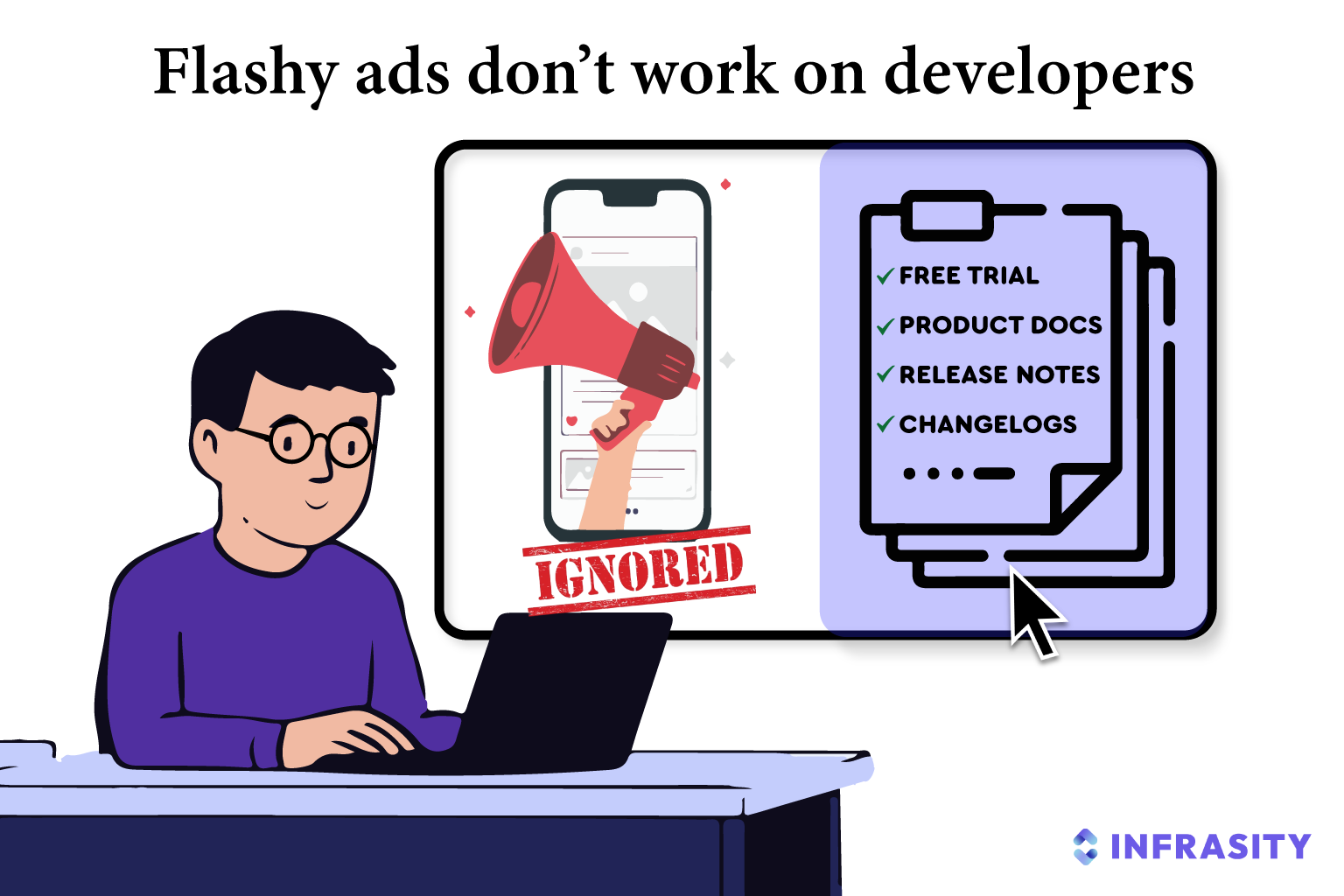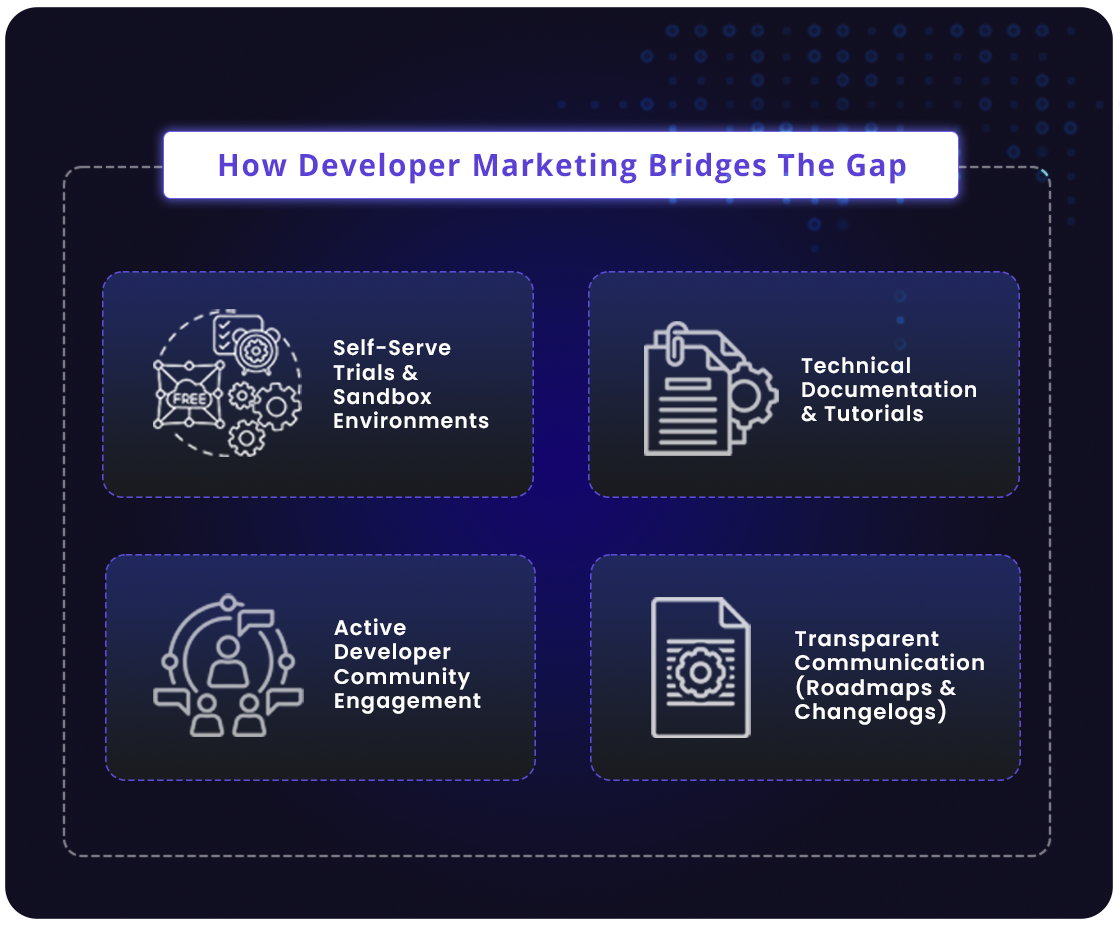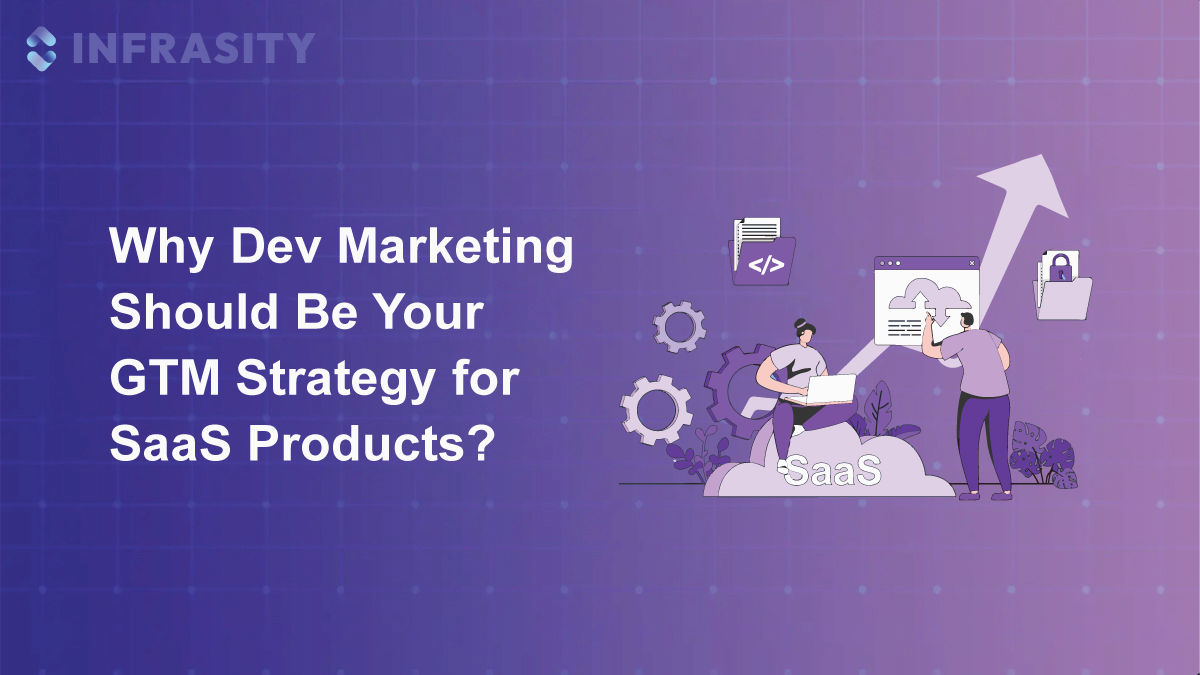Introduction
After developing a great SaaS product, you’re probably planning your go-to-market strategy. This is exactly what we’re going to discuss. You’ve likely seen plenty of marketing playbooks promoting generic marketing campaigns, flashy ads, or influencer hype as the keys to growth. But if you’re a B2B SaaS startup targeting developers or technical users, those generic tactics often miss the mark.
Developers don’t respond to hype or vague messaging; they want authenticity, technical depth, and clear proof that your product solves their real challenges. Not planning developer-focused marketing means overlooking the critical technical stakeholders - developers, engineers, and CTOs who collectively influence whether your product gets adopted and succeeds within their organizations.
That’s why it’s essential to shift your focus and market specifically to developers and technical decision-makers. In the next sections, you will learn what Developer Marketing is and why it matters as a foundation for your SaaS GTM strategy.
What is Developer Marketing?
Developer Marketing is all about speaking the language of developers, engineers, and technical decision-makers in a way that actually clicks with them. Unlike the usual generic and flashy marketing campaigns, developer marketing includes authenticity, technical depth, and practical value.

Think from your developers' perspective: they juggle tight deadlines, debug complex code, integrate multiple APIs, and ensure system reliability under pressure. They want tools that simplify their workflow and help them get things done faster. That means your marketing has to provide practical resources - clear documentation, transparent communication, and, frankly, a bit of nerdy detail; and that’s exactly where Developer Marketing proves its value.
Tired of wasting engineering time on content?
How This Y Combinator Company Leveraged Developer Marketing?
Stripe, founded in 2010, revolutionized online payments by making developers the center of their go-to-market strategy. They understood early that flashy ads and generic pitches wouldn’t win over technical users. Instead, Stripe focused on delivering easy-to-integrate APIs supported by clear, comprehensive documentation and practical code samples that allowed developers to onboard quickly and confidently.
Stripe also utilized some key strategies to engage developers and drive conversions:
Authentic Developer Engagement: They invested in building genuine relationships with their target users (developers) by actively participating in communities, hosting hackathons and meetups, and leveraging social media for meaningful interaction.
Strategic Pricing and MVP Mindset: Stripe employed strategic pricing to attract the right audience and adopted a minimum viable product (MVP) approach that allowed rapid iteration based on real-world developer feedback and usage.
Hands-On Onboarding: Rather than pushing hard sales pitches, Stripe empowered developers to try the product immediately and explore it at their own pace. This approach allowed their buyer personas to experience firsthand how the product solved their problems.
By focusing relentlessly on developer experience, Stripe not only solved complex payment challenges but also cultivated a passionate base of advocates who fueled rapid, organic growth. This developer-first marketing has become a blueprint for SaaS startups aiming to engage technical buyers and build lasting success.
Why Traditional Marketing Fails for Developers (And How Developer Marketing Fixes It)
Let’s say you’ve built an AI-powered code review agent that helps developers automatically detect bugs and suggest improvements in pull requests. You’re targeting developers, but if you follow the usual traditional marketing playbook, your efforts might look something like this:
- Launching flashy ads boasting “Revolutionary AI for Code Quality.”
- Sending mass emails packed with buzzwords and generic promises.
- Hosting polished sales demos focused on business ROI rather than technical depth.
- Running generic social media campaigns to generate leads.
While these tactics might have some relevance in raising general awareness, if you truly want to persuade and win over developers, you need a different approach. An approach that offers practical, real-world usage and detailed technical insights.
Here’s How Developer Marketing Fixes the Issue:

It offers self-serve trials and sandbox environments.
Developers can experiment with your AI agent risk-free and on their own schedule without sales pressure. This lowers barriers and respects their need for independent exploration.It offers detailed technical documentation, tutorials, and sample code. Clear product docs, use case guides, and technical blogs show exactly how your product integrates and solves real problems, helping developers build confidence and speeding up adoption.
It offers active engagement with developer communities.
By participating in forums, GitHub, open-source projects, and other developer spaces, you can build more credibility compared to traditional marketing efforts.It offers transparent communication through roadmaps and changelogs. Sharing your SaaS product’s ongoing development openly shows that you listen to your users' feedback and work on improving the product, which is one of the key factors for earning developers’ long-term trust.
So, these are some of the key devtools marketing strategies that shift the focus from generic promotion to marketing developer products smartly, driving engagement and conversions.
Every devtool startup needs content. Most do it wrong.
Conclusion
Developer Marketing is essential for B2B SaaS startups planning their go-to-market strategy. Unlike traditional generic marketing tactics, Dev Marketing speaks directly to developers through practical resources, authentic engagement, and transparent communication. It empowers developers to explore, evaluate, and adopt your product with confidence.
As you plan your efforts for marketing to developers to boost awareness and drive product adoption, partnering with experts who understand technical audiences can make a difference. Infrasity offers experienced technical writers and developers skilled in creating technical blogs, product documentation, and content, with a proven track record supporting leading Y Combinator startups and other top SaaS companies.
Book a Free Demo to discuss how we can help you craft developer-focused content that drives product adoption.
FAQs
1. Why Is Developer Marketing Important for B2B SaaS Startups?
Dev Marketing is important for B2B SaaS startups because it focuses on building genuine trust and credibility with the developers and technical leaders who are the real decision-makers behind whether your product gets adopted and integrated and ultimately drives growth within their organizations.
2. How Can Startups Measure the Success of Their Developer Marketing Efforts?
The success of Developer Marketing can be seen in how many developers sign up and actively use your product, how engaged they are with your technical content, and the activity within your developer community.
3. Who Are the Key Personas Targeted in Developer Marketing?
The key personas include developers, engineers, DevOps professionals, engineering managers, and CTOs, each playing a different role in evaluating and choosing products.
4. What Are the Common Challenges SaaS Startups Face When Implementing Developer Marketing?
The common challenges include understanding developer personas, creating authentic technical content, building community trust, and aligning marketing with product development.
5. How Long Does It Typically Take To See Results From a Developer Marketing Strategy?
It usually takes several months of consistent effort to build trust and engagement with developers before seeing meaningful results.



